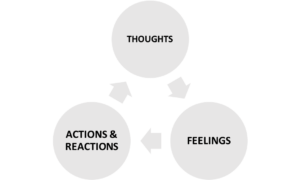You want to gain confidence in your sport, but you’re not having fun. Developing a positive mindset is key to gaining confidence in your sport. And this means having fun again. No matter your circumstances, there are some effective ways to bring the fun back into your sport.
A negative mindset will impact every area of your life, including your sport. Stress is often the culprit behind a negative mindset, and makes it impossible to have fun and gain confidence.
You have control over what you focus on. Although you cannot control what’s going on around you, you can make a conscious decision to redirect your focus, develop a more positive mindset, and thereby have fun and gain confidence.
The Thought – Feeling – Reaction Cycle
What are you focused on? Your thoughts create feelings, and your feelings create thoughts. In turn, how you feel determines how you act and react.
The thought/feeling/reaction cycle feeds on itself. Simply stated, negative thinking leads to negative feelings, which lead to negative reactions. On the flip side, positive thoughts create positive feelings, and positive actions and reactions.
The cycle looks like this:

Feel Better to Gain Confidence
Break the negative thought/feeling cycle. Much of our thinking is automatic, which means it’s beyond our conscious awareness. However, you can develop the ability to become aware of your thought/feeling cycle.
This gives you the power to choose different thoughts, and direct your focus accordingly. In turn, this will make you feel better and act in ways that benefit you and those around you.
Here’s how:
Develop awareness of your thoughts. Although it’s impossible to control all of your thoughts, you can become practiced at noticing when you are caught up in a negative thought/feeling cycle, and choosing to redirect your focus.
Here are the steps:
1. When you feel bad in any way (sad, angry, down, frustrated, etc.), write down how you feel.
2. Ask yourself this question: “What do I have to be thinking about and/or believing that makes me feel this way?”.
Write down the answer. This may be thoughts about something in the past or perceived future, beliefs about your current situation, other people, yourself, or something else.
For example, let’s say Joe feels bad about himself. His answer to ‘what would I have to be thinking about and/or believing that makes me feel this way’ may be ‘I keep procrastinating when it comes to my workouts, and therefore I am a loser.’
To parse this down further, the thought Joe is focused on is ‘I keep procrastinating when it comes to working out’. The belief is ‘I am a loser’.
Challenge your thinking. For each thought or belief that you wrote down, ask yourself:
Is this true? If you’re not sure, ask yourself if you have concrete evidence that shows it’s absolutely true. If you don’t then it’s not true.
Using the above example, Joe’s thought ‘I keep procrastinating when it comes to working out’ is true. However his belief ‘I am a loser’ is likely not true.
1. If it is true, what action can you take NOW to make an improvement?
For Joe the thought ‘I keep procrastinating’ is true. With this, the action he can commit to is to choose a time today when he will work out.
2. If it is not true, ask yourself what can you shift your focus to that would make you feel better.
Joe’s belief ‘I am a loser’ is untrue. Although he may feel like a loser when it comes to working out, it does not mean that he is truly a loser. Procrastinating does not make anybody a loser. What could Joe shift his focus to instead? He could shift his focus to committing to working out today.
Another Simple Practice To Gain Confidence
What do you love about your sport? An effective way to lure the fun back into your sport is to write a list of everything you love about your sport. With time you can continue to add to this list.
It may include feelings you love (competition, winning), aspects of teamwork (camaraderie, great coaching), details of specific skills (the sound and feel of hitting the ball), characteristics of your personality (ability to focus during games), etc. There are no wrong or right answers. This is a deeply personal list that includes anything and everything you love about your sport.
Every day, read this list to yourself. Notice how it makes you feel. Over time you may notice it helps you to feel the joy and fun of your sport, and bring it into your game.
Practice Practice Practice


